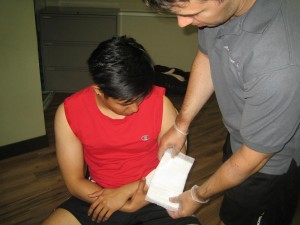Introduction
Severe bites from humans and animals can become infected if they’re not examined and treated as soon as possible. Always get medical assistance if you’ve been bitten by an animal or individual and the bite has pierced through the skin.
Humans and animals contain a significant amount of germs in their mouths, which can cause impurities if someone is bitten. These infections are seldom severe if treated fast, but sometimes they can extend to various parts of the body or into the blood stream.

Serious infections like rabies and tetanus, are very uncommon in places like the UK, but it’s essential to get severe bites examined and to get treatment to stop these infections.
Steps If You Have Been Bitten
Apply the following steps if you have been bitten:
- Rinse the wound straight away by holding it under warm water for about 10 minutes. Do this even if you can see the skin doesn’t seem pierced or broken.
- Make sure you remove any debris from the bite such as hair, sand or teeth.
- Squeeze the wound a little so it can bleed to flush out any dirt, except if it’s bleeding already.
- If the injury is bleeding profoundly, place a hygienic pad or antiseptic bandage over it and place some pressure on the wound.
- Pat the wound dry and shield it with a hygienic dressing or bandage.
- Use sedatives if you’re in agony, such as ibuprofen or paracetamol – kids beneath the age of 16 should avoid aspirin.
- Speak to your GP except if the injury is minor.
When To See Your GP
If the bite has pierced the skin, you must get medical assistance after rinsing the wound.
The doctor treating you might:
- Rinse the wound and get rid of any broken tissue
- Recommend antibiotics to avoid contamination
- Suggest particular treatment to avoid contaminations such as tetanus
- Conceal the injury with stitches if the possibility of infection is low – high-risk injuries will generally be left exposed because it will be easy to maintain and keep clean
- Organize blood tests to see if there is any infection or an X-ray to see if there’s anything entrenched in your wound.
- Send you for an examination by a specialist if the bite pierced a bone or joint, or there’s serious impairment, such as injury to the nerves – surgery might be compulsory in such instances
- If a person has HIV or hepatitis and they have bitten you, there’s a small possibility of the infection increasing if the bite is tainted with blood, so you might be given medication to avoid infection.